Please note, links to all the Freedom Essays are included at the end of this essay. Open any essay to read, print, download, share or listen to (as an audio).
Freedom Essay 24
How did consciousness emerge in humans?
Written by Jeremy Griffith, 2017
The previous Freedom Essay 23 focused on explaining the integrative meaning of existence, because an appreciation of that process is necessary to be able to understand the subject of this essay, which is the answer to that great biological question of how we humans became fully conscious (how consciousness emerged in humans is fully explained in chapter 7 of FREEDOM). This is an especially significant question when we consider that other animals haven’t been able to develop a fully conscious mind.
To present the explanation for how humans became conscious, it’s obviously first necessary to explain what consciousness is.
Nerves were originally developed for the coordination of movement in animals, but, once developed, their ability to store impressions—what we refer to as ‘memory’—gave rise to the potential to develop understanding of cause and effect. If you can remember past events, you can compare them with current events and identify regularly occurring experiences. This knowledge of, or insight into, what has commonly occurred in the past enables you to predict what is likely to happen in the future and to adjust your behaviour accordingly. Once insights into the nature of change are put into effect, the self-modified behaviour starts to provide feedback, refining the insights further. Predictions are compared with outcomes and so on. Much developed, nerves can sufficiently associate information to reason how experiences are related, learn to understand and become conscious of, or aware of, or intelligent about, the relationship between events that occur through time. Thus consciousness means being sufficiently aware of how experiences are related to attempt to manage change from a basis of understanding.
Since a conscious, self-adjusting mind would seem to be a very great asset for an animal to have, the obvious initial question when thinking about consciousness is, ‘Why haven’t many animals developed it?’ Despite this being an obvious question, it is conventionally argued that consciousness only emerged in humans because of our need to manage complex social situations—an argument known as the ‘Social Intelligence Hypothesis’. For example, the famous Harvard biologist E.O. Wilson relies upon this theory in The Social Conquest of Earth, when he says that ‘to feel empathy for others, to measure the emotions of friends and enemy alike, to judge the intentions of all of them, and to plan a strategy for personal social interactions…the human brain became…highly intelligent’ (2012, p.17 of 330). Social problem solving is an obvious benefit from being conscious, but all activities that animals have to manage would benefit enormously from being able to understand cause and effect, so it is completely illogical to argue that it wasn’t until the need to manage extremely complex social situations that consciousness developed. Any sensible analysis of the question of the emergence of consciousness must be based on the question of what has prevented its development in other animals. It is such a powerful asset for an animal to have that something must have stopped it being selected for in other species. The lack of social situations doesn’t explain why the fully conscious mind hasn’t appeared in non-human species. There was ample need for a conscious mind prior to the appearance of complex social situations.
So the question we have to ask is ‘What has prevented the development of consciousness in other animals?’ The answer to this question begins by first recognising that the meaning of existence is to develop the order of matter, the explanation for which was presented in the previous F. Essay 23. The second requirement is to recognise that, as a tool for developing order, the gene-based natural selection process (which has developed the great variety of life we see on Earth) has one great limitation. That limitation is that it normally can’t select for unconditionally selfless, altruistic, self-sacrificing behaviour because altruistic traits tend to self-eliminate—they tend not to carry on and so normally can’t become established in a species.
This is significant because, as was described in the essay on Integrative Meaning (F. Essay 23), for an arrangement of matter or whole to form and hold together, the parts of that whole must consider the welfare of the whole above their own welfare. Put simply, selfishness is divisive or disintegrative while selflessness is integrative. The problem for the gene-based natural selection process is that while altruistic, unconditional selflessness is the theme of existence, the glue that holds wholes together, it normally cannot develop this ‘glue’ of unconditionally selfless behaviour—again because altruistic traits tend to self-eliminate and therefore cannot normally become established.
It is true that the gene-based natural selection process will, to a degree, allow parts of a whole to cooperate and hold together if they each benefit from the cooperation. Situations of reciprocity can develop where one individual selflessly helps another on the proviso they are helped in return, because then both parties are still selfishly benefiting. So while situations of reciprocity can develop—in fact, such situations are the basis of the limited cooperation we see in most social species—completely stable, frictionless integration, where unconditionally selfless commitment to the maintenance of the greater whole occurs, cannot normally develop. (More on Integrative Meaning and the gene-based natural selection process is explained in the next essay, F. Essay 25: The truthful biology—the real story of the development of life, including humans.)
In fact, the gene-based natural selection tool for developing the order of matter on Earth normally actively resists self-sacrificing, altruistic behaviour. It is against altruism. It follows then that in terms of the development of consciousness, the gene-based natural selection process is, in effect, totally opposed to any altruistic, selfless thinking, and since altruism is the very theme and meaning of existence, such opposition blocks the development of honest, sound, effective thinking. Indeed, it makes sense that the gene-based natural selection process will and does develop instinctive blocks in the minds of animals to prevent the emergence of such truthful, selflessness-recognising, effective thinking. And it is this block against truthful thinking in the minds of almost all animals that prevents them from becoming conscious of the true relationship or meaning of experience. They are prevented from thinking effectively and thus from becoming conscious of the true relationship of events that occur through time.
An example of how genes resist self-destructive behaviour may be helpful here. In what are termed ‘visual cliff’ experiments, newborn kittens are placed on a table and while they will venture towards the edge of the table, they won’t allow themselves to go beyond the edge and fall—a sheet of glass is actually placed over the table to prevent them from accidentally slipping off the edge, but the point is the glass is unnecessary because the kittens instinctively know not to travel beyond the table’s edge. Presumably, this instinctive orientation against doing so evolved because any cat that did venture too close to a precipice invariably fell to its death, leaving only those that happened to have an instinctive block against such self-destructive practices. Natural selection develops blocks in the mind against behaviour that doesn’t tend to lead to the reproduction of the genes of the individuals who practise that behaviour.
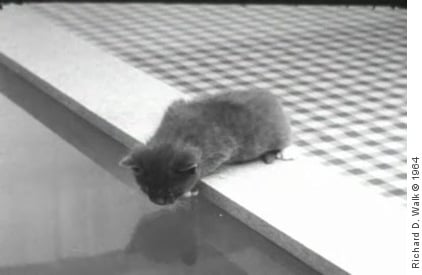
A kitten in the original visual cliff study carried out by
psychologists Eleanor J. Gibson and Richard D. Walk (1960)
So, just as surely as cats were eventually selected for their instinctive block against self-destruction, most animals have been selected with an instinctive block against selfless thinking because such thinking also tends not to lead to the reproduction of the genes of the individuals who think that way. The effect of this block was, as mentioned, to prevent the developing intellect from thinking truthfully and thus effectively.
Again, as was explained in the previous F. Essay 23, selflessness or love is the theme of existence, the essence of integration, the meaning of life. While the upset, human-condition-afflicted, alienated human race has learnt to live in denial of this truth of the selfless, loving, integrative meaning of existence, it is in fact an extremely obvious truth and one that is deduced very quickly if you are able to think honestly about the world. We are surrounded by integration. Every object we look at is a hierarchy of ordered matter, witness to the development of order of matter. It follows then that if you aren’t able to recognise and thus appreciate the significance of selfless, Integrative Meaning you are not in a position to begin to think straight and thus effectively; you can’t begin to make sense of experience. All your thinking is coming off a false base and is therefore effectively derailed from the outset from making sense of experience. As the philosopher Arthur Schopenhauer has written, ‘The discovery of truth is prevented most effectively…by prejudice, which…stands in the path of truth and is then like a contrary wind driving a ship away from land’ (Essays and Aphorisms, tr. R.J. Hollingdale, 1970, p.120 of 237). You can’t think effectively with lies in your head, especially with such important lies as denial of selflessness-dependent Integrative Meaning. Your mind is, in effect, stalled at a very superficial level of intelligence with little ability to understand the relationship of events occurring around you.
To elaborate, any animal able to associate information to the degree necessary to realise the importance of behaving selflessly towards others would have been at a distinct disadvantage in terms of its chances of successfully reproducing its genes. It follows then that those animals that don’t recognise the importance of selflessness are genetically advantaged, which means that eventually a mental block would have been ‘naturally selected’ to prevent the emergence of the ability to make sense of experience, to prevent the emergence of consciousness. At this point in development, genetic refinement favoured individuals that were not able to recognise the significance of selflessness, thus ensuring animals remained incognisant, unconscious of the true meaning of life.
Having denied the truth of Integrative Meaning and the importance of selflessness, it is not easy for the alienated human race to appreciate that conscious thought depends on the ability to acknowledge the significance of selflessness/love/Integrative Meaning. However, our own mental block or alienation is, in fact, the perfect illustration of and parallel for this block in the minds of animals. Unable to think truthfully about the selfless, loving integrative theme of existence, all our thinking has also been coming off a false base and, as a result, we too have been unable to think effectively. Alienation has rendered us almost stupid, incapable of deep, penetrating, meaningful thought. (F. Essay 25 explains how science, as a particular example of this, has been stalled by its denial of Integrative Meaning.)
When it comes to thinking truthfully and thus soundly, humans are now almost as mentally incognisant as animals—a state of affairs that is played on in the popular animated cartoon Wallace & Gromit (pictured above). In the series, Wallace is a lonely, sad—alienated—human figure whose dog Gromit is very much on an intellectual par with him in his world. Both wear the same blank, stupefied expression as together they muddle their way through life’s adventures.
Again, much more is explained in chapter 7 of FREEDOM about the nature of consciousness, how blocks developed against its development in the minds of most animals, and the similarities with our own alienation; however, suffice to say, the reality is that the human mind has been alienated from the truth twice in its history: once when we were like other animals, instinctively blocked from recognising the truth of selflessness, and then again in our species’ current adolescent state, during which we became insecure about our divisive nature with no choice but to live in what Plato described as a dark cave of denial of the selfless, loving integrative meaning of existence. (See Video/F. Essay 11 for more on Plato’s cave analogy.)
While humans have gradually retreated from consciousness into virtual unconsciousness because of our insecurity about our non-ideal, soul-corrupted, ‘fallen’, human-condition-afflicted state, we were, to our knowledge, the first animals to become fully conscious. So, the next question is, how were our ape ancestors able to overcome this block that exists in the minds of the great majority of animals and become capable of making sense of experience, become conscious?
Understanding how the nurturing process was able to develop selfless, moral instincts in our ape ancestors, and to a degree in bonobos (as was described in F. Essay 21), allows us to answer this crucial question. The reason we were able to become fully conscious is that, quite by accident, the nurturing of selfless instincts breached the block against thinking truthfully by superimposing a new, truthful, selflessness-recognising mind over the older, effectively dishonest, selfless-thinking-blocked one. Since our ape ancestors could develop an awareness of cooperative, selfless, loving meaning, they were able to develop truthful, sound, effective thinking and so acquired consciousness.
To use a comparative example, chimpanzees are currently in mental infancy—they have the conscious mental powers of, approximately, a two-year-old human and demonstrate rudimentary consciousness, making sufficient sense of experience to recognise that they are at the centre of the changing array of events they experience. They are beginning to relate information or reason effectively. Experiments have shown that they have an awareness of the concept of ‘I’ or self and are capable of reasoning how events are related sufficiently well to know that they can reach a banana tied to the roof of their cage by stacking and climbing upon boxes.
In the case of bonobos, evidence suggests that they are now the most intelligent or conscious animals next to humans. This level of intelligence or consciousness is evident in this quote: ‘Everything seems to indicate that [Prince] Chim [a bonobo] was extremely intelligent. His surprising alertness and interest in things about him bore fruit in action, for he was constantly imitating the acts of his human companions and testing all objects. He rapidly profited by his experiences…Never have I seen man or beast take greater satisfaction in showing off than did little Chim. The contrast in intellectual qualities between him and his female companion [a chimpanzee] may briefly, if not entirely adequately, be described by the term “opposites”’ (Almost Human, Robert M. Yerkes, 1925, p.248 of 278).
So how did the process of nurturing overcome the instinctive block? It makes sense that at the outset the brain was relatively small with a limited amount of cortex, the matter in which information is associated. These brains had instinctive blocks preventing the mind from making deep meaningful/truthful/selflessness-recognising perceptions. At this stage, however, these small, inhibited brains were being trained in selflessness, so although there was not a great deal of unfilled cortex available, what was available was being inscribed with a truthful, effective network of information-associating pathways. The mind was being taught the truth and given the opportunity to think clearly, in spite of the existing instinctive blocks or ‘lies’. While at first this truthful ‘wiring’ would not have been very significant due to the small size of the brain, it had the potential for much greater development, for were an individual to be born with a genetic make-up that meant it had a larger cortex it could receive more training of love in that cortex, thus producing a more selflessly trained and truthful, effective thinking, conscious being. And, as has been explained in F. Essay 21, with this selfless training/‘wiring’ of the brain occurring over many generations, the selfless ‘wiring’ would have gradually become instinctive or innate. Again, genetic selection will inevitably follow and reinforce any development process occurring in a species. The difficulty lay in getting the development of unconditional selflessness to occur, for once it was regularly occurring—as it now was as a result of love-indoctrination—it would naturally become instinctive over time, which it did. Our instinctive moral soul, the ‘voice’ of which is our ‘conscience’, was formed. We are born with a brain that has instinctive orientations that incline us to behave unconditionally selflessly towards others, and to expect to be treated unconditionally selflessly by others.
Thus, the brain was trained or inscribed or programmed or ‘brain-washed’ or ‘indoctrinated’ with the truthful ‘wiring’ necessary to think in spite of the original instinctive blocks working against such training; our mind had, at last, been stimulated by the truth.
Again, how consciousness emerged in humans is fully explained in chapter 7 of FREEDOM.
Overview
Having now explained how we acquired our altruistic moral instincts in F. Essay 21, and the integrative meaning of existence in F. Essay 23, and how we became conscious in this essay, it would be timely to re-emphasise how these elements of integratively orientated cooperative instincts and a conscious mind produced our psychologically upset human condition.
As explained in THE Interview and Video/F. Essay 3, and in chapters 1 and 3 of FREEDOM, our ‘good’ and ‘evil’ conflicted, psychologically upset lives are the result of an underlying battle between our original instinctive self and our newer conscious self. Basically, instincts, which are derived from the gene-based natural selection process, only give species orientations to the world, which means that when the nerve-based, fully conscious mind emerged that can make sense of cause and effect, it had to set out in search of understanding of the world to operate effectively. The problem was that this search for understanding by us fully conscious humans left us unjustly criticised by our instincts for acting independently of them, for, in effect, defying them, and until we could understand why we had to defy our instincts, all we could do was retaliate against their criticism, try to prove it wrong, and block it out; i.e., we became psychologically upset angry, egocentric and alienated sufferers of the human condition.
It should be pointed out that, as described in paragraph 259 of FREEDOM, all that is needed to produce a psychologically upset state in a species is for it to become fully conscious because that self-adjusting capability will naturally have to defy the non-insightful, intolerant, dictatorial instincts—and this particular psychosis would not involve repression of cooperative, loving instincts as occurred with us humans, just with repression of whatever instinctive orientation is present. However, what happens if the species’ instincts do happen to be cooperative and loving, as occurred in us, is that it creates a ‘double whammy’ effect because the upset angry and egocentric behaviour that results from defying the instincts, is then at odds with those moral instincts—causing even more guilt and upset. This means the human condition is an extremely guilt-ridden, horrendously upset state, which explains where the volcanic anger and potential for horrific violence in humans comes from. (This particular ‘double whammy’ effect from having moral instincts and its devastating consequences is described in chapter 3:5 of FREEDOM.)
So, in the case of us humans, when we became fully conscious we were acting in defiance of our species’ particular cooperative and loving moral instinctive self or ‘psyche’ or ‘soul’, the voice or expression of which is our ‘conscience’. Yes, our ‘conscience’ is defined as our ‘moral sense of right and wrong’, and our ‘soul’ as the ‘moral and emotional part of man’, and as the ‘animating or essential part’ of us (Concise Oxford Dictionary), while the Penguin Dictionary of Psychology’s entry for ‘psyche’ reads: ‘The oldest and most general use of this term is by the early Greeks, who envisioned the psyche as the soul or the very essence of life.’ Indeed, as the ‘early Greek’ philosopher Plato wrote about our integrative or ‘Godly’ (again, F. Essay 23 explains Integrative Meaning and its personification as ‘God’), ideal behaviour-expecting instinctive moral nature, we humans have ‘knowledge, both before and at the moment of birth…of all absolute standards…[of] beauty, goodness, uprightness, holiness…our souls exist before our birth…[our] soul resembles the divine’ (Phaedo, c.360 BC; 65-80). So, when our conscious self became upset by our particular cooperative and loving instinctive self, or psyche, or soul, and as a result, retaliated against it by attacking it, trying to prove it wrong, and denying it, our conscious self was ‘psychologically upset’; it was instinct offended. In fact, since ‘osis’ means ‘abnormal state or condition’ (Dictionary.com), we developed a ‘psychosis’ or ‘soul-illness’, and a ‘neurosis’ or neuron or nerve or ‘intellect-illness’. Our original gene-based, instinctive ‘essence of life’ soul or psyche became repressed by our intellect for its unjust condemnation of our intellect, and, for its part, our nerve or neuron-based intellect became preoccupied denying any implication that it is bad. We became psychotic and neurotic. (see pars 63, 258 & 379-382 of FREEDOM)
So that is how the elements of integratively orientated cooperative instincts and a conscious mind caused us humans to become sufferers of the extremely psychologically upset state of the human condition!
- - - - - - - - - - - - - - - - - -
Watch Jeremy Griffith present the breakthrough redeeming explanation of the human condition in THE Interview; for a fuller explanation read chapter 3 of FREEDOM; and for a summary presentation of the key ‘instinct vs intellect’ explanation watch Video/F. Essay 3.
Discussion or comment on this essay is welcomed—see below.
Please Note, if you are online you can read, print, download or listen to (as a podcast) THE Interview, The Great Guilt, The Great Transformation, Sermon On The Beach or any of the following Freedom Essays by clicking on them below.
INTRODUCTION TO THE EXPLANATION & RESOLUTION OF THE HUMAN CONDITION: THE Interview That Solves The Human Condition And Saves The World! | The Great Guilt that causes the Deaf Effect | The Great Transformation: How understanding the human condition actually transforms the human race | Sermon On The Beach | Freedom Essay 1 Your block to the most wonderful of all gifts | 2 The false ‘savage instincts’ excuse | 3 THE EXPLANATION of the human condition | 4 The ‘instinct vs intellect’ explanation is obvious – short | 5 The transformation of the human race | 6 Wonderfully illuminating interview | 7 Praise from Prof. Prosen | 8 “How this ends racism forever” | 9 “This is the real liberation of women” | 10 What exactly is the human condition? | 11 The difficulty of reading FREEDOM and the solution | 12 One hour summarising talk | 13 The WTM Deaf Effect Course | 14 Dishonest biology leads to human extinction | 15 How your life can immediately be transformed | 16 The Shock Of Change | THE BOOKS: 17 Commendations & WTM Centres | 18 FREEDOM chapter synopses | 19 FREEDOM’s significance by Prof. Prosen | 20 The genius of Transform Your Life | THE OTHER KEY BIOLOGICAL EXPLANATIONS: 21 How did we humans acquire our altruistic moral conscience? | 22 Fossil discoveries evidence our nurtured origins | 23 Integrative Meaning or ‘God’ | 24 How did consciousness emerge in humans? | 25 The truthful biology of life | • Survey seeking feedback | MEN & WOMEN RECONCILED: 26 Men and women reconciled | 27 Human sex and relationships explained | THE END OF RACISM: 28 The end of racism | 29 Can conflict ever end? | RESIGNATION: 30 Resignation | 31 Wordsworth’s all-revealing great poem | MORE ON THE TRANSFORMATION: 32 More on the Transformation | 33 Jeremy on how to become transformed | THE END OF POLITICS: 34 This understanding ends the polarised world of politics | 35 Death by Dogma left-wing threat | 36 Saving Western civilisation from left-wing dogma | 37 The meaning of superhero and disaster films | RELIGION DECIPHERED: 38 Noah’s Ark explained | 39 Christ explained | 40 Judgment Day finally explained | 41 Science’s scorn of religion | MEANING OF ART & CULTURE: 42 Cave paintings | 43 Ceremonial masks explained | 44 Art makes the invisible visible | • Second survey seeking feedback | 45 Prophetic songs | 46 Anne Frank’s faith in human goodness fulfilled | 47 Humour and swearing explained | 48 R.D. Laing’s fearless honesty | ABOUT BIOLOGIST JEREMY GRIFFITH: 49 Jeremy’s biography | 50 Australia’s role | 51 Sir Laurens van der Post’s fabulous vision | 52 Jeremy’s children’s book A Perfect Life | 53 The ‘instinct vs intellect’ explanation is obvious – long | 54 The accusation of hubris | DO WE FAIL OR DO WE MAKE IT? 55 Endgame for the human race | 56 Why there have been ferocious attacks on the WTM | 57 Magnificence of the Transformed State – video 1 | 58 Magnificence of the Transformed State – video 2 | MARKETING: 59 Shouldn’t the WTM’s website be toned down? | 60 The crime of ‘ships at sea’ ‘pocketing the win’ | GENERAL DISCUSSIONS BY JEREMY: 61 General Discussion by Jeremy Aug. 2018 | 62 Jeremy’s Masterpiece Presentation Feb. 2019 | HEALTH & HEALING: 63 Pseudo therapy/healing | 64 Real therapy/healing | From here on are Transformation Affirmations and More Good Info Emails
These essays were created in 2017-2024 by Jeremy Griffith, Damon Isherwood, Fiona Cullen-Ward, Brony FitzGerald & Lee Jones of the Sydney World Transformation Movement Centre. All filming and editing of the videos was carried out by Sydney WTM members James Press & Tess Watson during 2017-2024. Other members of the Sydney WTM Centre are responsible for the distribution and marketing of the videos/essays, and for providing subscriber support.

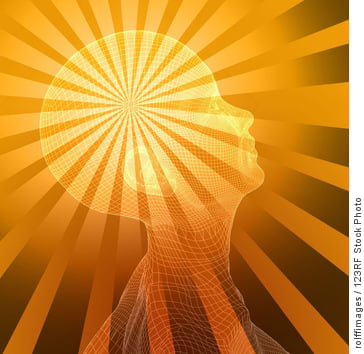
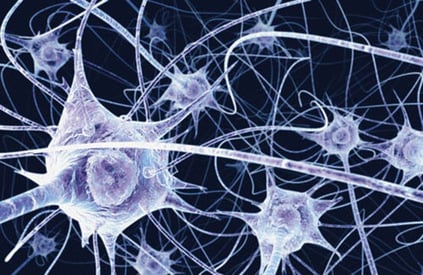
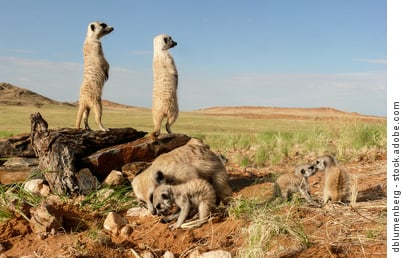
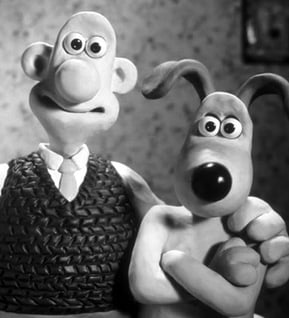
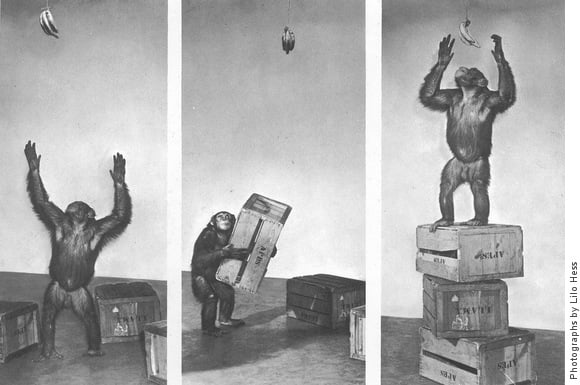
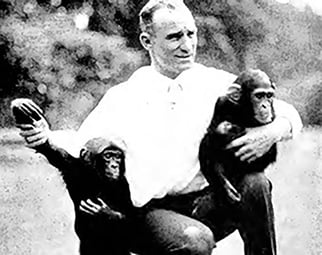
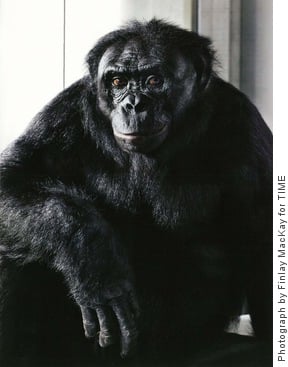

Please wait while the comments load...
Comments